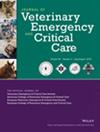2024 RECOVER Guidelines: Monitoring. Evidence and knowledge gap analysis with treatment recommendations for small animal CPR
Abstract
Objective
To systematically review evidence on and devise treatment recommendations for patient monitoring before, during, and following CPR in dogs and cats, and to identify critical knowledge gaps.
Design
Standardized, systematic evaluation of literature pertinent to peri-CPR monitoring following Grading of Recommendations, Assessment, Development, and Evaluation (GRADE) methodology. Prioritized questions were each reviewed by Evidence Evaluators, and findings were reconciled by Monitoring Domain Chairs and Reassessment Campaign on Veterinary Resuscitation (RECOVER) Co-Chairs to arrive at treatment recommendations commensurate to quality of evidence, risk:benefit relationship, and clinical feasibility. This process was implemented using an Evidence Profile Worksheet for each question that included an introduction, consensus on science, treatment recommendations, justification for these recommendations, and important knowledge gaps. A draft of these worksheets was distributed to veterinary professionals for comment for 4 weeks prior to finalization.
Setting
Transdisciplinary, international collaboration in university, specialty, and emergency practice.
Results
Thirteen questions pertaining to hemodynamic, respiratory, and metabolic monitoring practices for identification of cardiopulmonary arrest, quality of CPR, and postcardiac arrest care were examined, and 24 treatment recommendations were formulated. Of these, 5 recommendations pertained to aspects of end-tidal CO2 (ETco2) measurement. The recommendations were founded predominantly on very low quality of evidence, with some based on expert opinion.
Conclusions
The Monitoring Domain authors continue to support initiation of chest compressions without pulse palpation. We recommend multimodal monitoring of patients at risk of cardiopulmonary arrest, at risk of re-arrest, or under general anesthesia. This report highlights the utility of ETco2 monitoring to verify correct intubation, identify return of spontaneous circulation, evaluate quality of CPR, and guide basic life support measures. Treatment recommendations further suggest intra-arrest evaluation of electrolytes (ie, potassium and calcium), as these may inform outcome-relevant interventions.

 求助内容:
求助内容: 应助结果提醒方式:
应助结果提醒方式:


